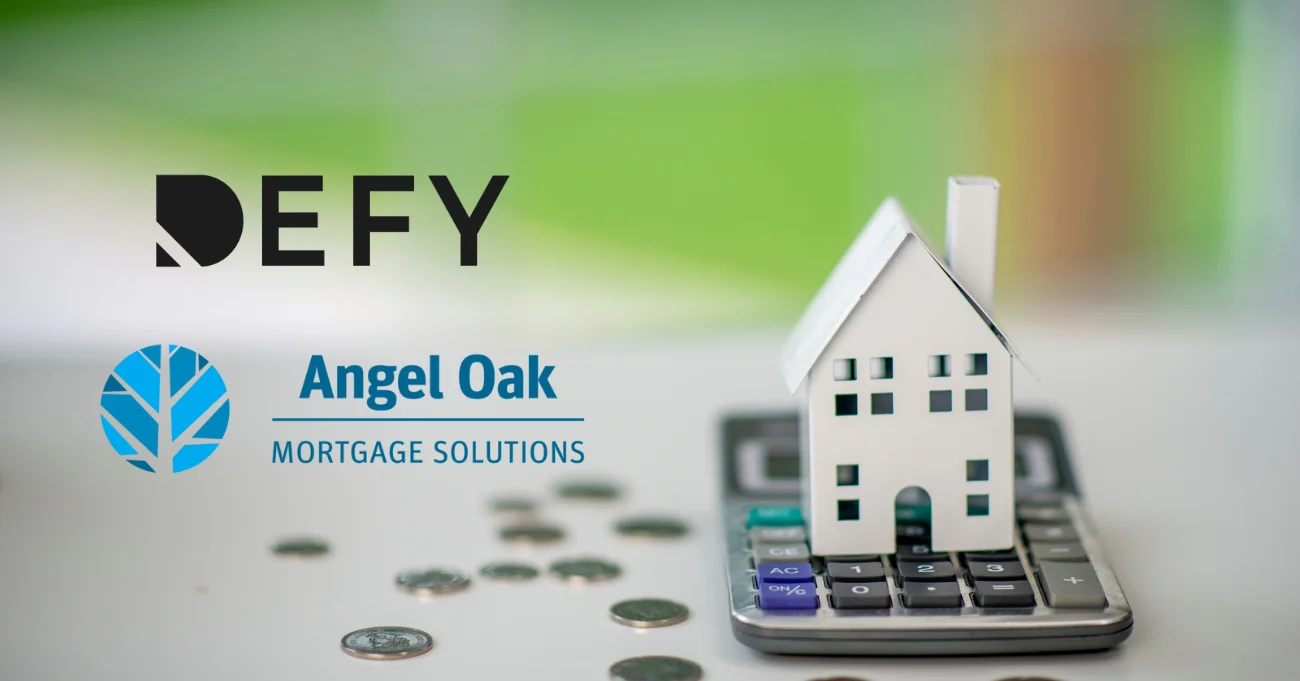Georgia homeowners have been experiencing a steady equity boom since the past decade, with an average home equity gain of $22,300 and 43.7% of its homes considered equity-rich as of 2024. Given these market conditions, financing solutions like a HELOC Georgia can be the perfect solution for homeowners looking to capitalize on their home’s value to fund continuing expenses.
At Defy Mortgage, we provide 75+ flexible and competitive mortgage solutions, including HELOCs and home equity loans. With our extensive experience in providing these loan options, we tailor each of our non-traditional lending options to fit the needs of each client perfectly.
Here’s all you need to know about home equity lines of credit in Georgia.
Eligibility Criteria for HELOCs in Georgia
Using our expertise in HELOCs, we’ve crafted this blog to guide you toward getting the most out of HELOCs in Georgia. We’ll go over the criteria you need to meet and the documents you have to submit to get approved. We’ll also give you step-by-step instructions on submitting your application, tips on how to get the best rates, and common mistakes to avoid.
Housing prices have been rising steadily in Georgia since 2017, increasing home equity and giving the average HELOC Georgia a sizable credit limit. With access to larger lines of credit, Georgia homeowners can cover major ongoing expenses like home improvements or college tuition more easily.
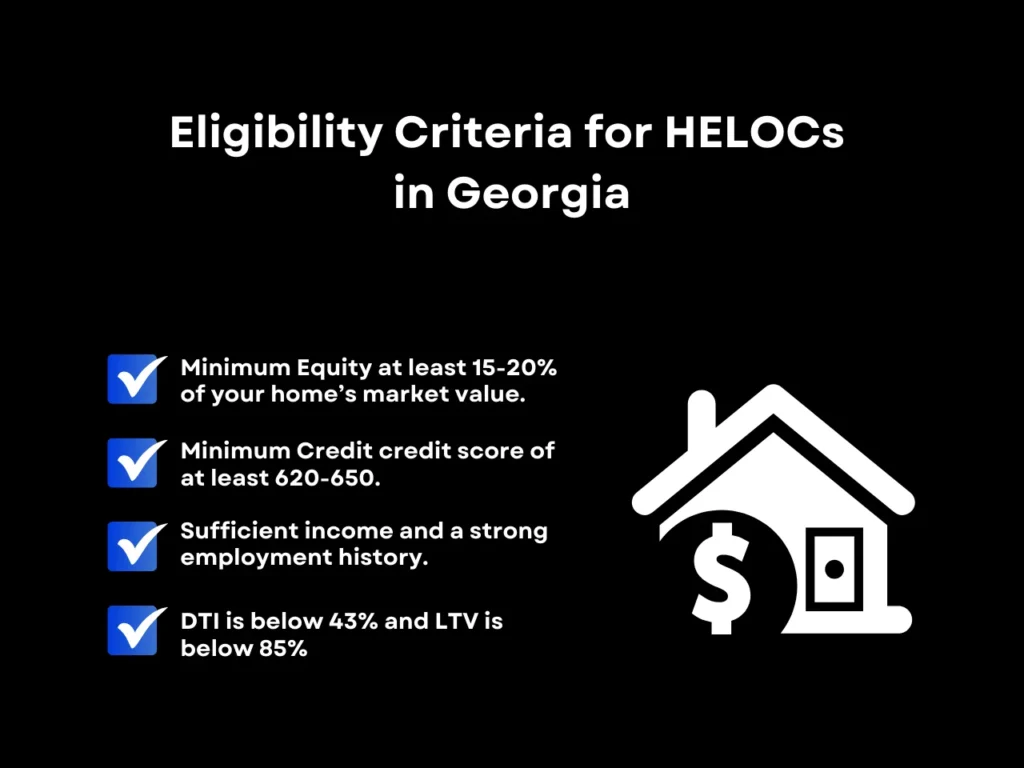
Minimum Equity
To qualify for a HELOC loan in Georgia, you need to have enough home equity, which is what you owe on your mortgage as a percentage of your home’s present market value. Lenders typically look for at least 15-20% equity, and the property has to be your primary residence. Your property will be assessed to verify its current market value. At Defy Mortgage we offer HELOCs in Georgia up to 85% LTV.
Minimum Credit
Lenders generally require a credit score of at least 620-650, with a score of 700 and above providing access to better rates and terms. When applying for a Georgia home equity line of credit, it’s advisable to have a good credit score to secure the best rates in the state, which are just above 6%.
Sufficient Income
You will have to prove that you have enough income and a good employment history to show lenders that you can afford repayment and are not likely to become unemployed as the life of the loan goes on.
DTI and LTV Ratios
DTI, or debt-to-income ratio, is the percentage of your gross monthly income that goes to debt payments. LTV, or loan-to-value ratio, is the total amount that you owe on all outstanding debts on your property divided by its total value.
Most lenders look for a DTI of no higher than 43%-50% and an LTV not exceeding 85%. If your ratios are higher than these thresholds, focus on paying down your existing debts before applying for a HELOC in Georgia to get favorable HELOC terms.
Comparing HELOC Rates Across Georgia
Although HELOCs are favored for their lower rates compared to home equity loans and personal loans, their rates can still vary significantly based on certain important factors. Here is some key information that can help you find the best HELOC rates in Georgia:
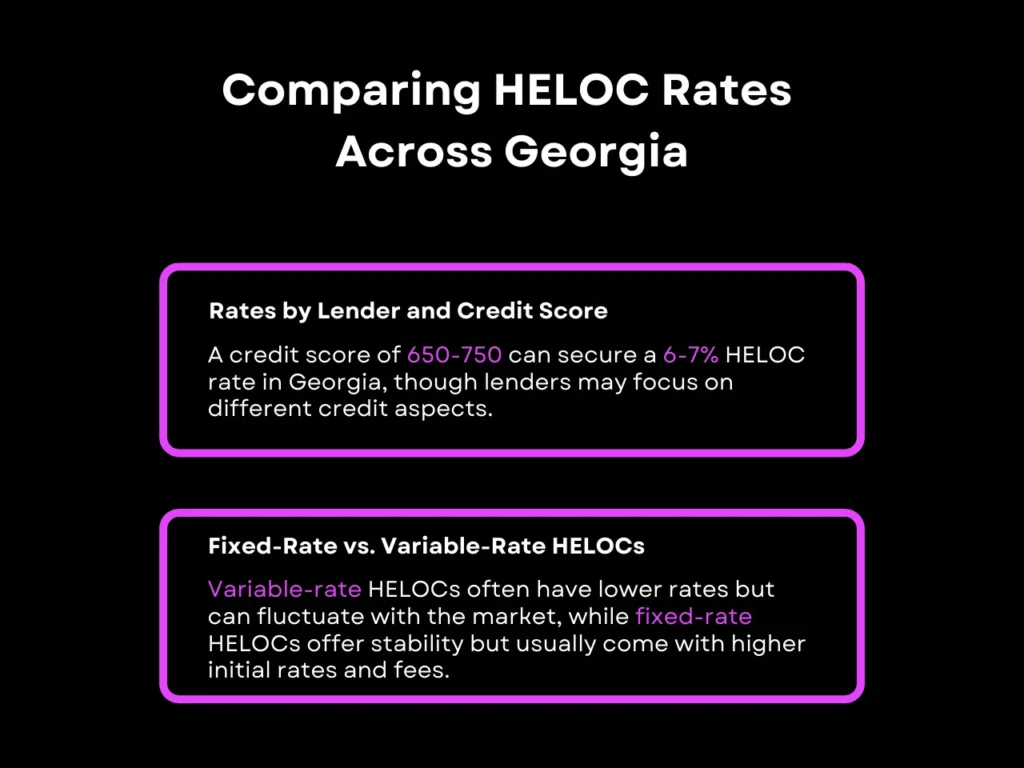
How Rates Vary by Lender and Credit Score
HELOC rates in Georgia can differ vastly between lenders, mostly because their services tend to work best for certain types of borrowers. Some lenders are particularly compatible with those who have bad credit, while others provide the most competitive rates for large loan amounts. Make sure to compare offers from different lenders to find one that best suits your specific needs.
Lenders can also have their own credit score requirements. A credit score of around 650 to 750 can give you a good HELOC rate in Georgia, around 6 to 7%. However, some lenders may pay more attention to certain aspects of your credit score, such as your payment history, when deciding your final rate.
Comparing Fixed-Rate and Variable-Rate HELOCs
HELOCs generally offer two types of interest rates: variable rate and fixed rate. The main advantage of a variable rate is that it’s usually lower compared to the rates on home equity loans and conventional loans. It’s also more in line with the actual amount borrowed. However, it’s subject to fluctuations based on market conditions, which can lead to your payments increasing or decreasing over time.
In contrast, with a fixed-rate HELOC, you pay the same rate no matter how much you borrow. This provides insulation from volatile market conditions that potentially increase that rate. However, fixed-rate HELOCs typically have higher initial interest rates, origination fees, and maintenance fees than traditional variable-rate HELOCs.
Applying for a HELOC in Georgia
Getting a HELOC in Georgia involves certain key steps, providing documents for the lender to evaluate your creditworthiness, and being mindful of potential mistakes that could complicate managing your HELOC. Let’s discuss what you need to know before submitting your application.
Step-by-Step Application Process
The process of getting a HELOC in Georgia starts with selecting a lender and submitting a loan application. The lender will then verify your income and home equity and assess your creditworthiness before offering you a HELOC. If you’re interested in applying for a HELOC, follow these steps:
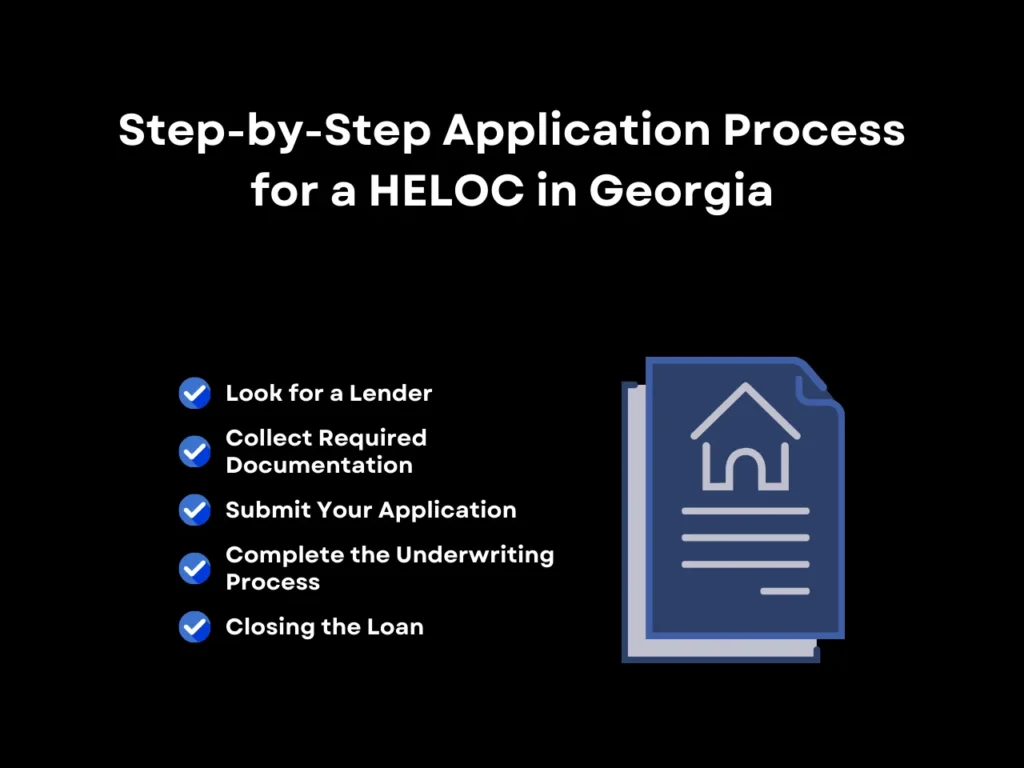
Step 1: Look for a Lender
Compare lenders in your area to find the best HELOC rates. Consider interest rates, repayment terms, and any fees the lender charges. Also, look at specific eligibility requirements such as credit score, income, and LTV/CLTV ratio. Additionally, consider minimum/maximum borrowing amounts, associated fees, and options on accessing your HELOC, such as whether you can withdraw with a debit card.
Step 2: Collect Required Documentation
Once you have found a lender, gather all the documents they require. Commonly required items include proof of income, tax returns, recent pay stubs, and property documents like your home title or mortgage statement. Keep in mind that different lenders might require different documentation for a HELOC in Georgia.
Step 3: Submit Your Application
After gathering the necessary documents, it’s time to apply. Complete the form provided by the lender with your personal information, home value, and remaining mortgage balance. You should also receive an early disclosure form after submitting your application.
Step 4: Complete the Underwriting Process
Once your application is submitted, the lender will underwrite it. This involves verifying all of the information you shared and asking for any additional required information. At this stage, the lender will also schedule your home’s appraisal to estimate its current market value, which can cost $300 to $600 for a single-family home.
Step 5: Close the Loan
Closing on a HELOC is similar to closing on any other mortgage. After underwriting and home appraisal are completed, your lender will notify you of the approval and provide details, such as your maximum loan amount, interest rate, and closing costs.
A closing attorney will meet you to sign the loan documents. Upon doing so, you typically have 3 business days to cancel the loan if you change your mind. If you don’t, you can access your HELOC funds after the 3-day period has expired.
Documents Needed for Application
The full range of documents you need to apply for a HELOC can vary between lenders, but typically, there are some documents that they commonly look for. Make sure you get the following ready for a smooth application process:
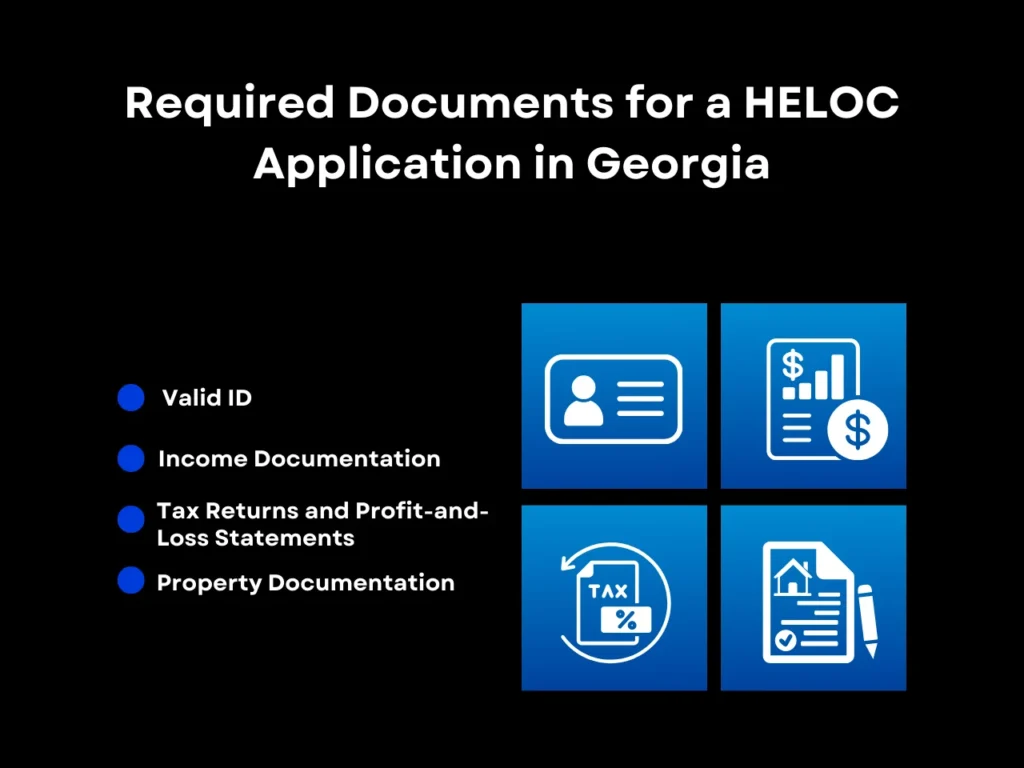
- Valid ID: You must provide a valid government-issued photo ID, social security number, current and previous addresses, and employer’s name and address. Your lender will need your name and social security number to verify your credit reports, as well as to ensure that you are the person whose name you will use on the HELOC application.
- Income Documentation: You must show proof of income and steady employment to ensure that you can repay what you borrow. This can include pay stubs for at least the past four weeks and W-2 forms for the past two years, as well as any income award letters, such as disability or pension documentation.
- Tax Returns, Profit-and-Loss Statements and Bank Statements: These only apply to self-employed individuals and business owners, and individuals who don’t receive traditional pay stubs and W-2 forms, such as 1099 contract workers, self-employed individuals, entrepreneurs and those with several income streams. Not all lenders may ask for bank statements and 1099 forms if applicable, but it’s important to note that some do ask for: Tax returns, W-2s/10-99s, bank statements, investment statements etc.
- Property Documentation: This includes a copy of your mortgage statement, most recent property tax bill, and homeowners insurance papers. Lenders may also ask for flood insurance papers and other relevant environmental documentation.
You may also have to disclose information about your assets, which can serve as collateral. However, this often doesn’t include assets you hold jointly with or on behalf of another person, such as a college savings account.
Common Pitfalls to Avoid During the Application
There are certain mistakes you can make during the HELOC application process that can make managing your loan more difficult in the long run. Make sure to avoid these common pitfalls:
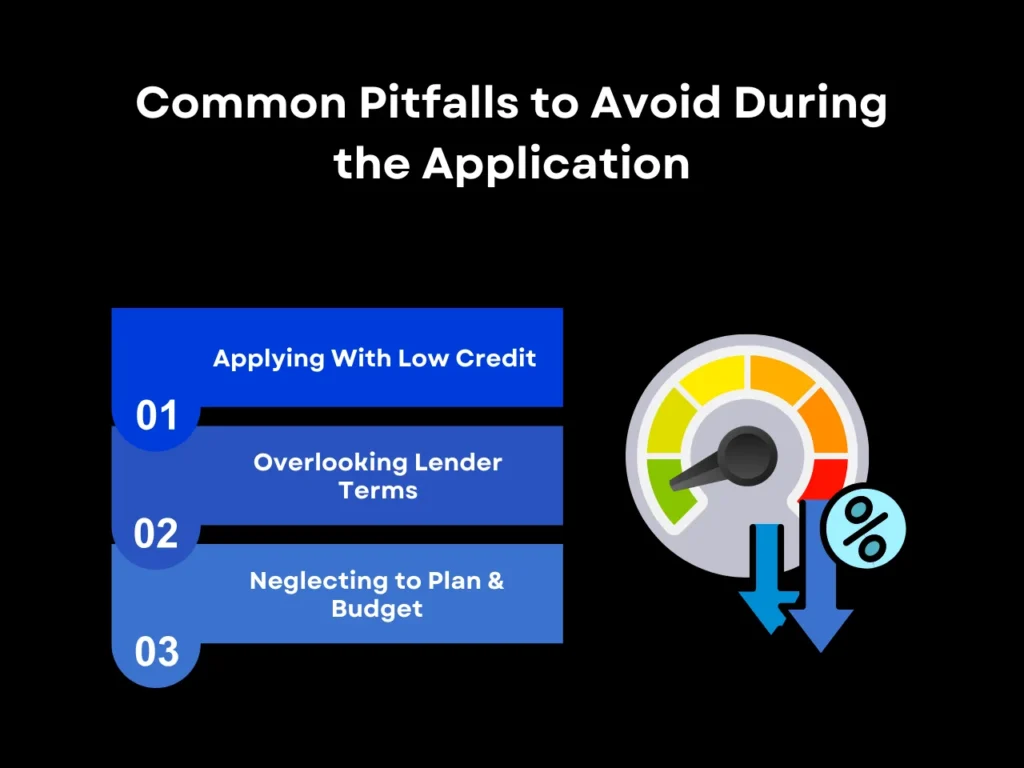
Applying With Low Credit
Applying with your score on the low end can lead to you paying more interest than you need to. In many cases, it’s best to take the time to improve your credit score before applying for a HELOC.
Overlooking Lender Terms
Carefully read and understand all the terms and conditions of the HELOC you’re applying for. Lenders can hide key information, such as prepayment penalties, within wordy, jargon-filled paragraphs. If anything is unclear, be sure to ask your lender for clarification before signing your name on the loan papers.
Neglecting to Plan and Budget
Although HELOCs are great for unexpected expenses and dynamically adjusting what you borrow as needed, it’s still best to have a concrete plan for how you’ll use your funds. This ensures that you don’t overspend and accumulate too much debt.
HELOC Georgia FAQs
What’s the Average HELOC Rate in Georgia?
The average HELOC rate in Georgia ranges from 6% to 7%. The rate you receive will depend on credit scores and market conditions, such as home prices in your county.
Can You Use a HELOC in Georgia to Consolidate Your Debt?
Yes, you can. Juggling multiple debts with high interest rates can feel overwhelming. If you’re struggling to stay on top of different debt payments and staying afloat, there are options. Debt consolidation can be a powerful tool to regain control over your financial situation. A homeowner’s equity in their home can be a tremendous source of wealth. By unlocking your current home equity with a HELOC in Georgia, you can consolidate your debt while retaining full ownership of your property.
Can I Get a HELOC with a Low Credit Score in Georgia?
It is possible to be approved for a HELOC with low credit in Georgia. However, your lender may give you higher rates as a result. Consider improving your credit score to get the best rates. Credit score requirements for a HELOC in Georgia can range from 620-700 depending on the lender.
How Does a HELOC Differ From a Home Equity Loan?
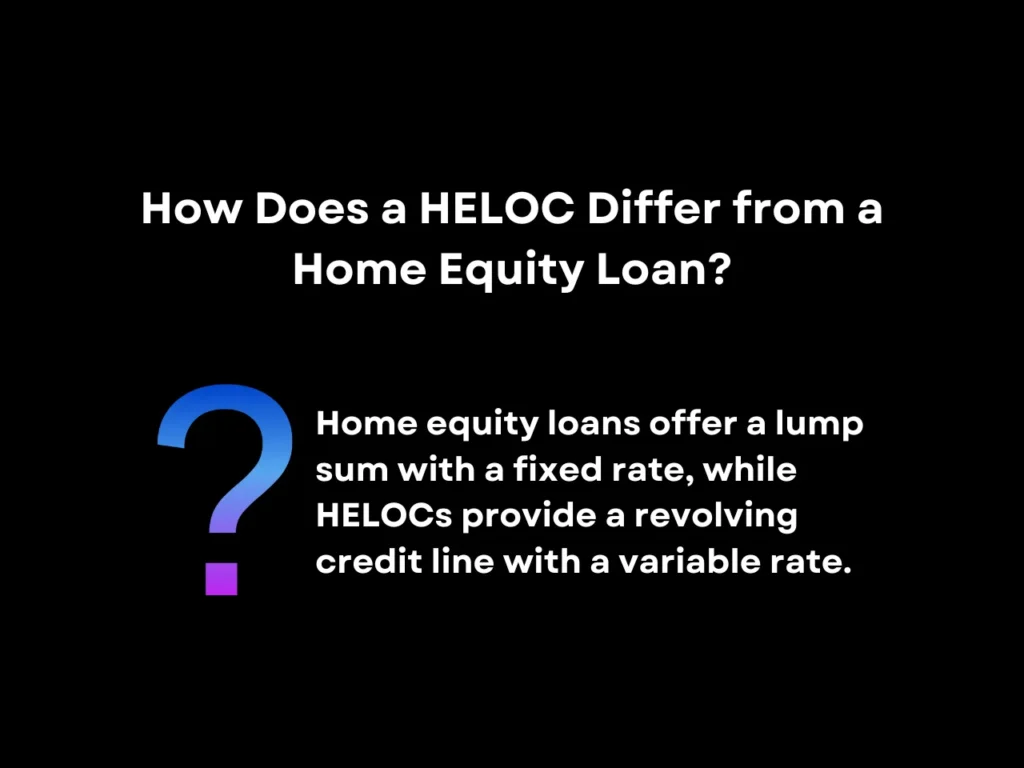
Home equity loans provide a lump sum with a fixed interest rate that applies to the entire sum. HELOCs are a revolving line of credit, meaning they let you borrow up to a certain amount as needed, and they usually have a variable interest rate.
Are There Any Prepayment Penalties for a HELOC in Georgia?
Whether you will have to pay prepayment penalties depends on the lender. Those who do impose such penalties usually charge between 2% and 5% of the total outstanding balance.
Can I Use a HELOC for Non-Home-Related Expenses?
Yes, you can use HELOCs for whatever purpose you see fit, including education expenses, managing debt, or even leisure purposes.
Key Takeaway
While home equity loans are often best for large one-time expenses, a HELOC Georgia can give you a more flexible and economical way to access your home’s equity. With a HELOC, you can borrow only what you need, when you need it. This allows you to adjust your debt dynamically and respond quickly to ongoing financial needs without taking out a lump sum.
If you’re considering a HELOC in Georgia, make sure you have at least 15-20% equity in your home, maintain a good credit score (preferably 700 or higher but we can go as low as 620 FICO at Defy), and aim for a debt-to-income (DTI) ratio no higher than 43%-50% to get the best rates. Additionally, avoid applying with low credit, always review lender terms carefully, and plan how to use the funds to prevent overspending.
Looking for the best HELOC Georgia rates? Reach out to Defy today and let our mortgage experts guide you through the process and help you secure the most competitive rates available. We offer everything from HELOCs, DSCR loans, and more, customizing each loan option to the unique needs of each borrower.


